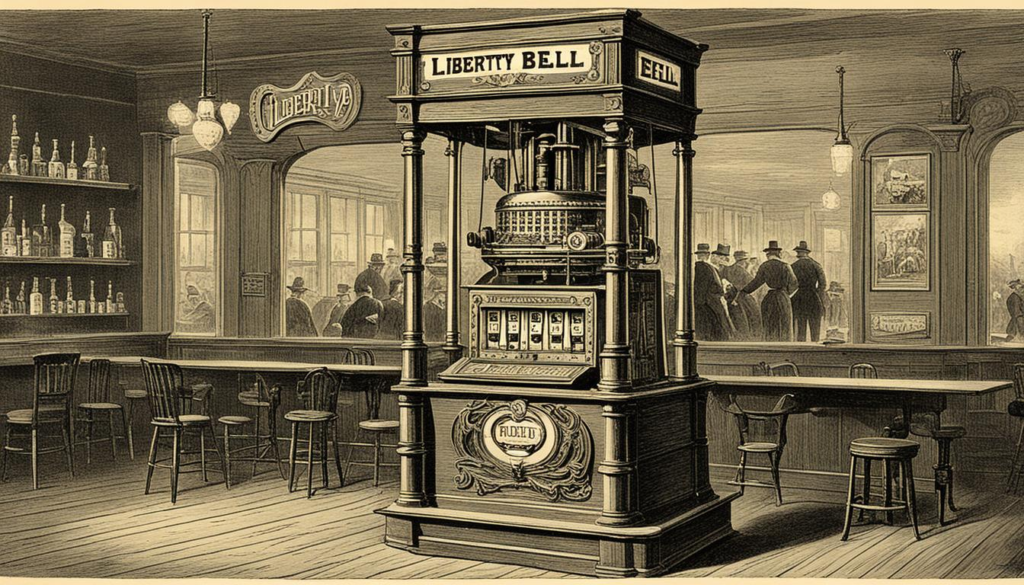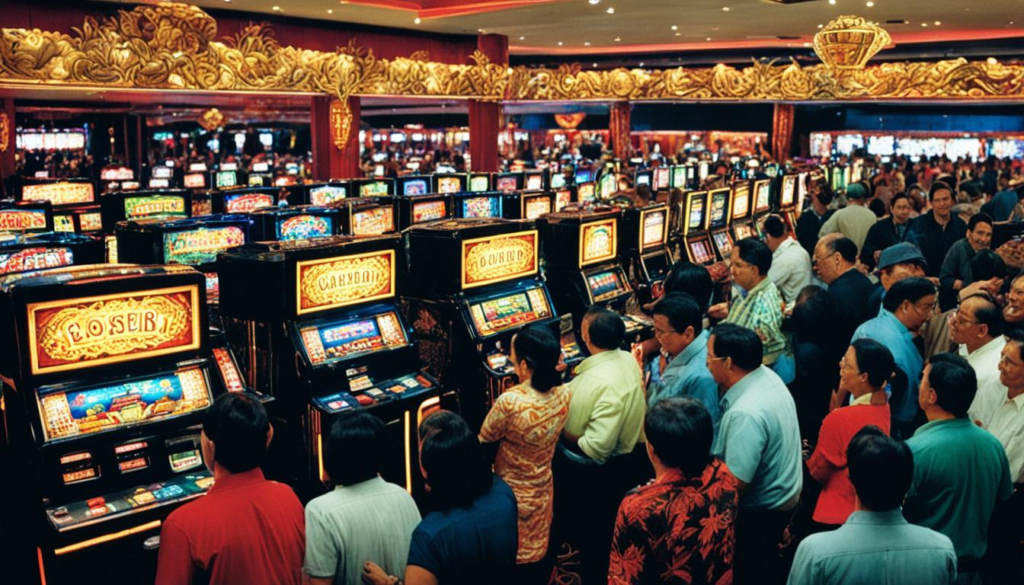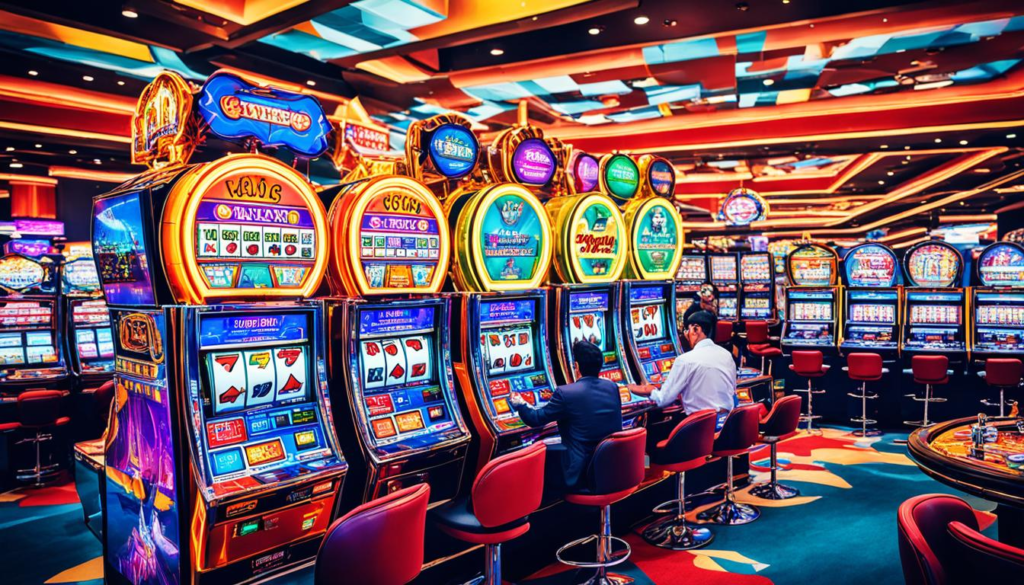Introduction
Slot machines have fascinated gamblers for over a century, evolving from simple mechanical devices to complex digital systems. This article explores the rich history of slot machines, their journey across continents, and their growing popularity in Indonesia.
The Origins of Slot Machines
Early Gambling Devices
Gambling has ancient roots, with early forms of dice and cards appearing in numerous cultures. However, the concept of a machine designed for gambling emerged in the late 19th century.
The First Slot Machine
In 1891, a company in Brooklyn, New York, developed a gambling machine based on poker. Players would insert a coin and pull a lever to spin five drums with card faces, aiming to align a winning poker hand. The machine’s payout system relied on the bar staff, who rewarded winners with drinks or cigars.
In 1895, Charles Fey, a San Francisco mechanic, revolutionized gambling with the “Liberty Bell,” the first true slot machine. The Liberty Bell featured three reels with five symbols: hearts, diamonds, spades, horseshoes, and the Liberty Bell. Matching three bells yielded the highest payout of 50 cents.
The Evolution of Slot Machines

Mechanical to Electrical
The mechanical slot machines dominated the early 20th century. However, the 1960s saw the introduction of electromechanical slot machines by Bally Technologies. These machines used electric motors and solenoids, allowing for more complex designs and higher payouts.
Introduction of Video Slots
The 1970s brought another significant advancement: video slot machines. The Fortune Coin Company developed the first video slot machine in 1976. These machines used a modified 19-inch Sony Trinitron color receiver for the display, offering more engaging gameplay and higher earning potential for casinos.
Slot Machines in the United States
Regulation and Legalization
Slot machines faced varying degrees of regulation in the United States. Nevada legalized gambling in 1931, creating a haven for slot machines. Other states followed suit, each with its own regulatory framework.
Growth of Casinos
The legalization of gambling led to the rapid growth of casinos, especially in Las Vegas and Atlantic City. Slot machines became a staple in casinos, contributing significantly to their revenue. Technological advancements and creative game designs further increased their popularity.
Introduction of Slot Machines in Asia
Slot Machines in Macau
Macau, often dubbed the “Gambling Capital of the World,” saw the introduction of slot machines in the late 20th century. The liberal gambling laws and influx of tourists made Macau an ideal market for slot machines, leading to a booming industry.
Expansion to Other Asian Markets
Following Macau’s success, other Asian markets began exploring the potential of slot machines. Countries like Singapore, the Philippines, and Malaysia saw a rise in casinos and slot machine gaming, contributing to the region’s gambling industry growth.
The Arrival of Slot Machines in Indonesia

Initial Introduction
Slot machines made their way to Indonesia as part of a broader wave of gambling innovations spreading across Asia. The early 2000s saw the first slot machines being introduced in select locations, primarily catering to tourists and affluent locals.
Early Challenges and Regulations
Indonesia’s predominantly Muslim population and strict gambling laws posed significant challenges to the spread of slot machines. Authorities maintained a stringent stance on gambling, leading to a complex regulatory environment that operators had to navigate.
Cultural and Social Impact in Indonesia
Public Perception
The public perception of slot machines in Indonesia has been mixed. While some view them as a form of entertainment and a potential source of revenue, others see them as morally dubious and a potential social ill.
Gambling Culture
Despite legal restrictions, a gambling culture exists in Indonesia, often operating underground. Slot machines have found a niche in this environment, appealing to those seeking the thrill of gambling in a controlled, albeit illegal, setting.
Regulation and Legal Issues in Indonesia
Gambling Laws
Indonesia’s gambling laws are strict, with most forms of gambling deemed illegal. Slot machines are no exception, facing stringent regulations and enforcement efforts aimed at curbing their spread.
Efforts to Control Illegal Gambling
The Indonesian government has taken various measures to control illegal gambling, including raids, fines, and public awareness campaigns. These efforts have had varying degrees of success, with illegal gambling operations often finding ways to evade authorities.
Technological Advancements in Indonesian Slot Machines
Online and Mobile Slots
The digital revolution has brought online and mobile slots to Indonesia, bypassing some of the legal restrictions. These platforms offer greater accessibility and anonymity, attracting a growing number of players.
Innovation in Game Design
Indonesian slot machine operators have embraced innovation, incorporating advanced graphics, interactive features, and themed games to attract players. These innovations enhance the gaming experience, making slot machines more appealing.
Current Trends in Indonesian Slot Machine Industry
Popularity and Market Size
The popularity of slot machines in Indonesia has grown, driven by the rise of online and mobile gaming. The market size, though difficult to quantify due to the illegal nature of many operations, is significant.
Tourism and Casinos
Tourism plays a crucial role in the Indonesian slot machine industry. Resorts and casinos catering to tourists often feature slot machines, contributing to the local economy and attracting visitors.
Economic Impact of Slot Machines in Indonesia

Revenue Generation
Slot machines generate substantial revenue, both legally and illegally. This revenue supports various sectors, including tourism, hospitality, and technology.
Employment Opportunities
The slot machine industry creates employment opportunities, from game developers and casino staff to maintenance and security personnel. This employment supports local economies and provides livelihoods for many Indonesians.
Challenges Facing the Slot Machine Industry in Indonesia
Regulatory Hurdles
The primary challenge facing the slot machine industry in Indonesia is regulatory. Strict gambling laws and enforcement efforts limit the industry’s growth and present significant operational risks.
Social Concerns
Social concerns, including addiction and moral objections, pose additional challenges. Addressing these issues requires a balanced approach that considers the industry’s economic benefits and social impacts.
Future Prospects of Slot Machines in Indonesia
Potential for Growth
Despite the challenges, the potential for growth in the Indonesian slot machine industry is considerable. The rise of digital platforms and increasing tourism provide avenues for expansion.
Predicted Trends
Predicted trends include further digitalization, increased integration of virtual reality, and more personalized gaming experiences. These trends are likely to shape the future of slot machines in Indonesia.
Conclusion
The history of slot machines is a fascinating journey from mechanical devices to digital entertainment. In Indonesia, slot machines have navigated a complex landscape of cultural, social, and regulatory challenges. Despite these hurdles, they continue to grow in popularity, driven by technological advancements and changing market dynamics. The future of slot machines in Indonesia looks promising, with potential for significant economic impact and continued innovation.
FAQs
- Are slot machines legal in Indonesia? Slot machines are generally illegal in Indonesia, with strict regulations and enforcement efforts aimed at curbing their spread.
- How did slot machines first arrive in Indonesia? Slot machines were introduced to Indonesia in the early 2000s, primarily catering to tourists and affluent locals.
- What is the economic impact of slot machines in Indonesia? Slot machines generate substantial revenue and create employment opportunities, supporting local economies.
- How has technology influenced the slot machine industry in Indonesia? Technological advancements, including online and mobile slots, have made slot machines more accessible and appealing to Indonesian players.
- What are the future prospects for slot machines in Indonesia? The future looks promising, with potential for growth driven by digitalization, increased tourism, and innovative game designs.
